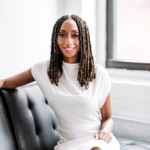 A’shanti Gholar
A’shanti Gholar
February 25, 2022 began like most days, quiet and mundane. But as I headed to the dentist that Friday morning, my phone started chiming nonstop with text alerts: Judge Ketanji Brown Jackson had become the first Black woman nominated to the Supreme Court. Like many Black women across the country, I’d been waiting with anticipation for President Biden to name his pick to fill the vacancy Justice Breyer had left on the Court. Fast-forward to today, as the Senate Judiciary Committee begins its confirmation hearings for Jackson.
Our nation’s highest court has never benefited from the perspective of a Black woman and this wasn’t set to change until recently. In the 232 years since the Supreme Court first convened in 1790, 115 justices have served on the bench. Of those, two have been Black men, four have been white women, and one, a Latina woman of color. That’s 108 white men. Having worked as a political strategist and activist for more than 15 years, I applaud Biden’s efforts to diversify the courts and celebrate Jackson’s historic nomination. But I’m also hyperaware that we still have a long way to go in terms of representation in our government. Honestly, a “long way to go” is even a bit of an understatement.
Right now, there are no Black women in the U.S. Senate. None. There’s never even been a Black woman governor. Even more alarming, only 7% of all mayors in the top 100 most populous cities in the U.S. identify as Black women. Too often we are excluded from the decision-making rooms that impact us the most. We are living in a country with a representational government that does not actually reflect its people.
As I’ve learned throughout the years, a career in politics is designed very specifically for white men, making it exponentially more difficult for women of color to climb the ladder. I first joined Emerge, an organization that recruits and trains Democratic women to run for office in 2006, when I was the president of the Young Democrats of Nevada, secretary of the Nevada Democratic Party, and working for our only woman member of Congress at the time. I was one of only a handful of young Black women engaged in statewide politics and knew we needed more racial and gender representation. The majority of our elected officials and party leaders were older white men, and despite the Young Democrats of Nevada being formed in the 1960s, I was the first woman and woman of color to be elected president of the organization almost 40 years later. Forty years.
As one of the very few Black women in these roles, I knew I had to work much harder than my white colleagues to be recognized and taken seriously. Early on in my career, I realized that despite my love for politics, I would have to contend with systems and institutions that were built by people who did not look like me and deal with microaggressions and inappropriate comments from those around me who claimed to be progressive.
Doing this work, I also got a behind-the-scenes glimpse of the cultural and structural barriers Black women face while being elected into public office. They are often passed over by major donors and viewed as not being viable even when holding similar credentials as other candidates receiving those donations. In fact, large donors raised only a third of the funds for Black women’s campaigns compared to what they raised for white women in competitive primaries, according to an Open Secrets report. When I meet with Black women candidates and elected officials, I hear this from them directly.
Black women are also judged more on their appearance and presence instead of their policies and platforms. In 2016, I recall reading a story about a Georgia school teacher who called Michelle Obama a “gorilla” who “needs to focus on getting a total makeover (especially the hair)” on Facebook. Similarly, in 2017, Bill O’Reilly called Representative Maxine Waters’ hair a “James Brown wig.” To unpack this disproportionate criticism of Black women’s hair, I



